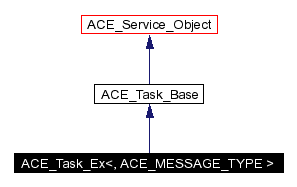
#include <Task_Ex_T.h>
Inheritance diagram for ACE_Task_Ex<, ACE_MESSAGE_TYPE >:


Public Types | |
| typedef ACE_Message_Queue_Ex< ACE_MESSAGE_TYPE, ACE_SYNCH_USE > | MESSAGE_QUEUE_EX |
Public Methods | |
| ACE_Task_Ex (ACE_Thread_Manager *thr_mgr=0, MESSAGE_QUEUE_EX *mq=0) | |
| virtual | ~ACE_Task_Ex (void) |
| Destructor. | |
| MESSAGE_QUEUE_EX * | msg_queue (void) |
| Gets the message queue associated with this task. | |
| void | msg_queue (MESSAGE_QUEUE_EX *) |
| Sets the message queue associated with this task. | |
| int | putq (ACE_MESSAGE_TYPE *, ACE_Time_Value *timeout=0) |
| int | getq (ACE_MESSAGE_TYPE *&mb, ACE_Time_Value *timeout=0) |
| int | ungetq (ACE_MESSAGE_TYPE *, ACE_Time_Value *timeout=0) |
| int | reply (ACE_MESSAGE_TYPE *, ACE_Time_Value *timeout=0) |
| int | put_next (ACE_MESSAGE_TYPE *msg, ACE_Time_Value *timeout=0) |
| int | can_put (ACE_MESSAGE_TYPE *) |
| Tests whether we can enqueue a message without blocking. | |
| const ACE_TCHAR * | name (void) const |
| ACE_Task< ACE_SYNCH_USE > * | next (void) |
| Get next Task pointer. | |
| void | next (ACE_Task< ACE_SYNCH_USE > *) |
| Set next Task pointer. | |
| ACE_Task< ACE_SYNCH_USE > * | sibling (void) |
| Alwasy return 0. | |
| ACE_Module< ACE_SYNCH_USE > * | module (void) const |
| Return the Task's Module if there is one, else returns 0. | |
| int | flush (u_long flag=ACE_Task_Flags::ACE_FLUSHALL) |
| void | water_marks (ACE_IO_Cntl_Msg::ACE_IO_Cntl_Cmds, size_t) |
| Manipulate watermarks. | |
| void | dump (void) const |
| Dump the state of an object. | |
Public Attributes | |
| MESSAGE_QUEUE_EX * | msg_queue_ |
| Queue of messages on the ACE_Task.. | |
| int | delete_msg_queue_ |
| 1 if should delete Message_Queue, 0 otherwise. | |
| ACE_Module< ACE_SYNCH_USE > * | mod_ |
| Back-pointer to the enclosing module. | |
| ACE_Task< ACE_SYNCH_USE > * | next_ |
| Pointer to adjacent ACE_Task. | |
| ACE_ALLOC_HOOK_DECLARE | |
| Declare the dynamic allocation hooks. | |
Private Methods | |
| void | operator= (const ACE_Task_Ex< _ACE_SYNCH, ACE_MESSAGE_TYPE > &) |
| ACE_Task_Ex (const ACE_Task_Ex< _ACE_SYNCH, ACE_MESSAGE_TYPE > &) | |
Friends | |
| class | ACE_Module< ACE_SYNCH_USE > |
| class | ACE_Module_Type |
Unlike ACE_Task, these class doesn't have the ability to be a part of a Stream chain. I.e. You cannot (yet) chain modules based on ACE_Task_Ex.
Now specialized version of ACE_Task with ACE_Message_Block as its ACE_MESSAGE_TYPE...
template <ACE_SYNCH_DECL> class ACE_Task <ACE_SYNCH_USE, ACE_Message_Block> : public ACE_Task_Base { // put here the good old ACE_Task code };
When User (and legacy code) write ACE_Task<ACE_MT_SYNCH>, specialized ACE_Task code is in action.
|
|||||
|
|
|
||||||||||||||||
|
Initialize a Task, supplying a thread manager and a message queue. If the user doesn't supply a ACE_Message_Queue pointer then we'll allocate one dynamically. Otherwise, we'll use the one passed as a parameter. |
|
||||||||||
|
Destructor.
|
|
||||||||||
|
|
|
||||||||||
|
Tests whether we can enqueue a message without blocking.
|
|
||||||||||
|
Dump the state of an object.
|
|
||||||||||
|
Flush the task's queue, i.e., free all of the enqueued message blocks and releases any threads blocked on the queue. Note that if this conflicts with the C++ iostream <flush> function, just rewrite the iostream function as ::<flush>. |
|
||||||||||||||||
|
Extract the first message from the queue (blocking). Note that <timeout> uses <{absolute}> time rather than <{relative}> time. Returns number of items in queue if the call succeeds or -1 otherwise. |
|
||||||||||
|
Return the Task's Module if there is one, else returns 0.
|
|
||||||||||
|
Sets the message queue associated with this task.
|
|
||||||||||
|
Gets the message queue associated with this task.
|
|
||||||||||
|
Return the name of the enclosing Module if there's one associated with the Task, else returns 0. |
|
||||||||||
|
Set next Task pointer.
|
|
||||||||||
|
Get next Task pointer.
|
|
||||||||||
|
|
|
||||||||||||||||
|
Transfer message to the adjacent ACE_Task_Ex in a ACE_Stream. Note that <timeout> uses <{absolute}> time rather than <{relative}> time. |
|
||||||||||||||||
|
Insert message into the message queue. Note that <timeout> uses <{absolute}> time rather than <{relative}> time. |
|
||||||||||||||||
|
Turn the message around and send it back down the Stream. Note that <timeout> uses <{absolute}> time rather than <{relative}> time. |
|
||||||||||
|
Alwasy return 0.
|
|
||||||||||||||||
|
Return a message to the queue. Note that <timeout> uses <{absolute}> time rather than <{relative}> time. |
|
||||||||||||||||
|
Manipulate watermarks.
|
|
|||||
|
|
|
|||||
|
|
|
|||||
|
Declare the dynamic allocation hooks.
|
|
|||||
|
1 if should delete Message_Queue, 0 otherwise.
|
|
|||||
|
Back-pointer to the enclosing module.
|
|
|||||
|
Queue of messages on the ACE_Task..
|
|
|||||
|
Pointer to adjacent ACE_Task.
|
 1.2.18
1.2.18